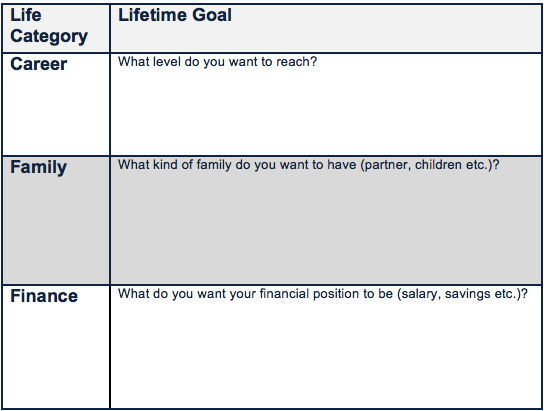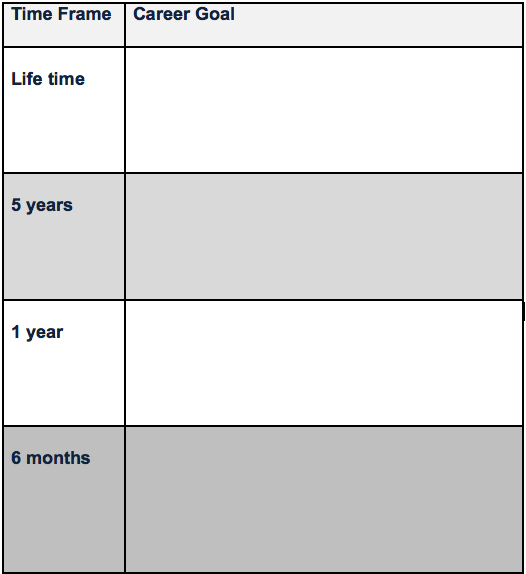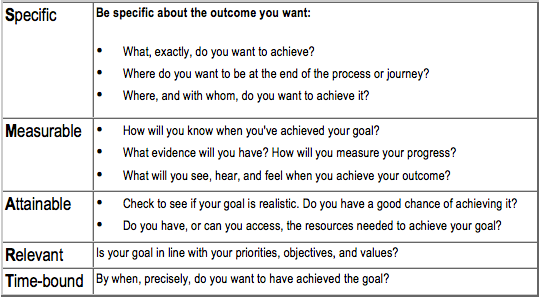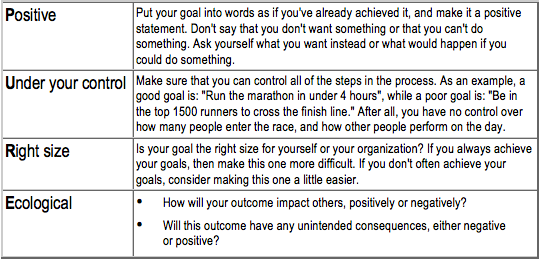
|
Knowing how to set and achieve goals is undoubtedly one of the most beneficial skills you can develop during your lifetime. Without goals you end up leading a much different kind of life, often filled with ongoing boredom and dissatisfaction. Setting goals encourages you to stretch and become greater in every facet of your life. Having goals also leads to increased satisfaction and fulfillment in both your professional and personal endeavors.
Achieving goals is a measure of success, and being able to meet job challenges is the way success is measured in the workplace.
Goal setting capitalizes on the human brain's amazing powers: Our brains are problem-solving, goal-achieving machines.

|
Planning is essential to the attainment of all goals. It's true for short-term, medium-term, and long-term goals, as well as those of either a personal or professional development nature. And, your effectiveness at planning has great impact on how likely you are to achieve your goal. The most elaborate goal and the most detailed action plan will be useless if it never leaves the drawing board. Therefore, goal setting, and plotting the action plan, works best if it is simple. Don't mistake simple for easy. There is genius in simplicity.
You will need some quiet time to explore what it is that you truly want to achieve in life. Continue asking the question "Why do I want that?" until you come to the core of your desire. Then, you are ready to put it on paper. Writing your goals down is an important step; it is a form of commitment.

|
Lifetime goals, by definition, involve a long-term plan. They cannot be achieved in one action, but require perhaps thousands of dedicated steps. Once you have your lifetime goals crystallized, however, the steps are quite easy to identify. Goal setting is a sequential process. For each of your lifetime goals, you need to set gradual shorter-term goals that lead you toward your longer term lifetime goals.
The following template may help you in the goal-setting process.

|

|
PLANNING
When done effectively, planning represents time well spent. The "benefits" well exceed the "costs."
Perhaps some common misconceptions of what a plan is, and what it does, have caused many people to shy away from the planning process. First, planning is not deciding each step in detail, in advance, and then blindly following through. Nor is it taking a leisurely stroll through the mind in hopes of coming up with a loosely connected stream of thoughts.
Good planning lies somewhere in between these extremes. What's more, a good plan should be looked on as a means for achieving goals, not as an end in itself. While it's impossible to completely avoid crises and unexpected events, either in business or in your personal life, you should still try to plan as much as you can. Good planning pays off by creating direction, excitement, and motivation. It also increases your ability to manage those around you.
Clarify your goal using the SMART formula and a PURE perspective.
SMART is based on Edwin Locke's goal-setting theory.
SMART stands for:

|
Now that you've defined your goal using the SMART formula, take another look at your outcome from a PURE perspective, and rewrite it as necessary. The PURE formula was developed by Roger Terry.

|
While it is important to put your goals on paper, they are not etched in stone. With any changes in your life circumstances, your goals will change. Visit your plans often, celebrate your accomplishments, and re-commit to an action plan. Above all, stick with it.
Persistence and Consistency will pay off handsomely.

|
Maggie Sayers is a professional development coach and a Master Optician. Her optical career started over 30 years ago in a family business in Germany.
Since she came to Florida in 1987, she has worked diligently to promote high professional standards in opticianry. Her mission is to help opticians achieve their personal success through serving the public as vision experts.
As a professional development coach Maggie provides education workshops that focus on leadership and personal engagement. Her time management course has inspired many participants to think outside the box, apply newly acquired knowledge and achieve extraordinary results.
Maggie's enthusiasm for opticianry is inspiring and her keen business sense paired with excellent communication skills make her a highly sought after motivational speaker.












